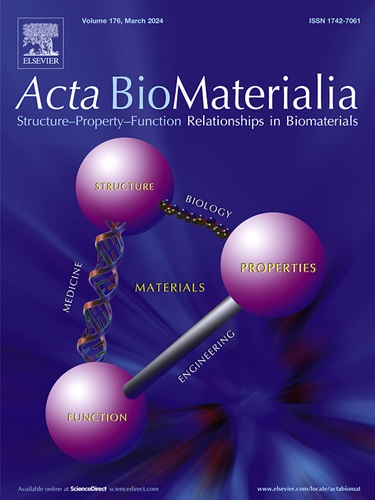具有白细胞介素 2 持续释放功能的自发光纳米工程细菌作为原位疫苗用于增强癌症免疫疗法。
IF 9.4
1区 医学
Q1 ENGINEERING, BIOMEDICAL
引用次数: 0
摘要
基于细菌的原位疫苗接种(ISV)已成为一种有效的治疗方法,通过激活抗肿瘤免疫。然而,诱导免疫原性细胞死亡(ICD)和促进效应T细胞活化仍然是基于细菌的ISV临床应用的关键挑战。在这里,我们开发了一种肿瘤微环境激活的纳米杂交工程细菌ISV。它由蓝光响应模块(EL222)和自发光透明质酸(LHA)纳米粒子设计而成。我们的研究表明,LHA在过氧化氢的刺激下产生局部蓝光,非侵入性地激活工程大肠杆菌产生IL-2。工程细菌作为免疫佐剂,促进树突状细胞成熟,协同促进T细胞浸润,最终触发免疫系统的全面激活。此外,当与免疫检查点抑制剂抗pd - l1联合使用时,该方法进一步有效地增强了癌症免疫治疗。我们的研究结果为基于细菌的ISV免疫治疗的发展提供了新的策略和前景。意义声明:本研究开发了一种肿瘤微环境激活的纳米杂交工程细菌(Ec-mIL2@LHA)作为原位疫苗,用于增强癌症免疫治疗。细菌疫苗中的LHA在TME的过氧化氢刺激下无创地产生蓝光,导致工程细菌持续释放低剂量的il - 2。体外和体内研究表明,细菌原位疫苗诱导免疫原性细胞死亡,促进树突状细胞成熟,最终引发抗肿瘤免疫的全面激活。与抗pd - l1联合后,细菌原位疫苗进一步有效增强肿瘤免疫治疗,抑制肿瘤转移。我们提供了一种有希望的策略,通过工程化细菌疫苗来增强抗肿瘤免疫效应,显示出潜在的临床应用。本文章由计算机程序翻译,如有差异,请以英文原文为准。

Self-luminous nanoengineered bacteria with the sustained release of interleukin 2 as an in situ vaccine for enhanced cancer immunotherapy
Bacteria-based in situ vaccination (ISV) has emerged as an effective therapeutic approach by activating anti-tumor immunity. However, inducing immunogenic cell death (ICD) and promoting effector T cell activation remain critical challenges in clinical applications of bacteria-based ISV. Here, we have developed a tumor microenvironment-activated nano-hybrid engineered bacterium as ISV. It was engineered with a blue-light response module (EL222) and self-luminous luminal hyaluronic acid (LHA) nanoparticles. Our study demonstrates that LHA generates local blue light stimulated by hydrogen peroxide, non-invasively activating the engineered Escherichia coli to produce IL-2. The engineered bacteria serve as an immunological adjuvant, promoting dendritic cell maturation, synergistically promoting T cell infiltration, and ultimately triggering a comprehensive activation of the immune system. Furthermore, when combined with the immune checkpoint inhibitor anti-PD-L1, this approach further effectively enhances cancer immunotherapy. Our results provide new strategies and promising prospects for the development of bacteria-based ISV immunotherapy.
Statement of significance
This study developed a tumor microenvironment-activated nano-hybrid engineered bacteria (Ec-mIL2@LHA) as in situ vaccine for enhanced cancer immunotherapy. The LHA in bacterial vaccine non-invasively generated blue light upon stimulation by hydrogen peroxide of TME, leading to the sustained release of low-dose IL2 by engineered bacteria. In vitro and in vivo studies have demonstrated the bacterial in situ vaccine induced the immunogenic cell death and promote maturation of dendritic cells, ultimately triggering a comprehensive activation of anti-tumor immunity. After combination with anti-PD-L1, the bacterial in situ vaccine further effectively enhance cancer immunotherapy and inhibit metastasis. We provide a promising strategy to amplify antitumor immune effects by an engineered bacterial vaccine, showing potential clinical applications.
求助全文
通过发布文献求助,成功后即可免费获取论文全文。
去求助
来源期刊

Acta Biomaterialia
工程技术-材料科学:生物材料
CiteScore
16.80
自引率
3.10%
发文量
776
审稿时长
30 days
期刊介绍:
Acta Biomaterialia is a monthly peer-reviewed scientific journal published by Elsevier. The journal was established in January 2005. The editor-in-chief is W.R. Wagner (University of Pittsburgh). The journal covers research in biomaterials science, including the interrelationship of biomaterial structure and function from macroscale to nanoscale. Topical coverage includes biomedical and biocompatible materials.
 求助内容:
求助内容: 应助结果提醒方式:
应助结果提醒方式:


